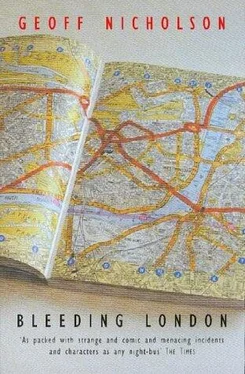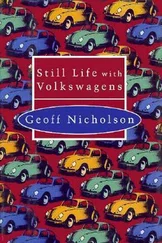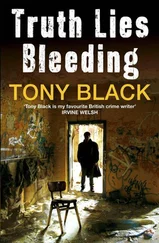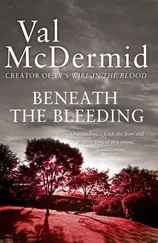Stuart knew this could only be Colin’s second or third tour, and when he saw the new boy in action, Stuart realized what a truly rotten choice he’d made. Colin was a suit-wearing, red-faced, Bunterish young man. He had a fussy, put-upon manner, and his voice, although clear and expressive, was never very loud. What was worse, as Stuart now saw, he was completely incapable of dealing with a group. The would-be walkers milled around him, willing him to exercise some control, to offer some direction, at the very least to say something to them, but as he repeatedly cleared his throat, looked at his watch, flapped his arms and ultimately did nothing useful, the group increasingly ignored him, one or two of them would start to wander off. Only then would he mutter something after them, by which time they were out of earshot.
Eventually, despite having been unable to command any attention, he decided to start the tour anyway, using more or less the exact words that Stuart had set down for him. He had been speaking for several minutes before any members of the group realized he’d started, and having realized, they began to ask each other what they’d missed, thereby missing more. The overall effect was of a Shakespearean rabble making crowd noises.
Stuart watched the spectacle and his feelings moved rapidly from derisive amusement through exasperation to anger. He crossed the street and joined the group, apparently as a spectator. Guides were always warned to make sure this didn’t happen. It was all too easy for casual passers-by to join the tour late and avoid paying. Stuart stood close to Colin but it was some time before the new guide became aware of his boss’s presence, and the moment he did so his mouth dangled open and although it still moved as though speaking, no sound came out at all.
“All right,” said Stuart loudly, busily, taking control. “Amateur hour’s over. Step back, Colin. Then look and learn.”
Colin, surprised but visibly relieved, retreated several large paces and the group turned towards Stuart. His abrupt dismissal of their guide had established a dubious sort of authority. They were glad to have someone who looked as though he knew what he was doing, but his treatment of the young man had been rather nastily dismissive. Their sympathy still needed to be won even if their expectations had been set up.
Stuart stood silently for as long as he could, milking their attention, then he said, “Around the corner in Russell Square you’ll find the Bloomsbury Hotel. Within it you’ll find the Virginia Woolf hamburger bar. Alas, Mrs Woolf’s views on the hamburger are not recorded in her writings but we do know that she committed suicide because she couldn’t bear to live through the horrors of the Second World War.
“You would probably have to ask to what extent Virginia Woolf was actually affected by the horrors of the Second World War, after all she wasn’t exactly on the front line, but then it’s no good saying that a person’s reasons for killing herself aren’t good enough. Arguably, she might have tried to kill herself by wandering the streets of wartime London waiting for the right bomb, or perhaps by driving an ambulance during air raids, or why not by joining some secret show and accepting a suicide mission behind enemy lines? Instead she chose death by drowning and she chose to do it out of London. She apparently thought the country had more tone.”
The group wasn’t quite with him yet. Stuart had a feeling that many of them probably hadn’t actually heard of Virginia Woolf, or if they had, they thought of Liz Taylor in the Edward Albee play, but at least his talk of hamburgers and death and war had drawn them in.
“There’s a story told by Casanova about his stay in London,” Stuart continued. “He was sitting in a coffee house and heard two Englishmen talking about a friend of theirs who’d recently committed suicide. The first man said he thought the suicide had been a perfectly reasonable action considering the state of their friend’s finances. But the other man disagreed. He’d been a creditor of the dead man and had been able to take a look at his accounts. In his opinion the friend needn’t have killed himself for another six months.”
There was thin, polite, self-conscious laughter as Stuart concluded the anecdote, not a storm of mirth but enough for him to go on, a sign at least that they knew he was trying to entertain them.
“Yes,” he said, “London’s not at all a bad place to die. Freud did it here. Karl Marx too. Plenty more besides, most of them against their will: Jack ‘the Hat’ McVitie, Charles I, Thomas More.”
“Is this a true story?” one of the women asked, but she was ignored.
“Welcome to London,” Stuart said grandly. “A city much possessed by death. Come, let’s walk on.”
He set off briskly across Russell Square in the direction of the British Museum. He had no scarf or cloak to throw over his shoulder as he went, yet there was something sweeping and theatrical about his progress. It would have been demeaning to look back and make sure the group was with him, but he felt sure they were. As he walked he said, “You think London isn’t a necropolis? Let me tell you it is. And people love it. Our cemeteries are popular tourist attractions. People pile into the British Museum and all they want to see are the mummies. They pack into Madame Tussaud’s to look at a population of wax corpses. They go to the London Dungeon to gloat over torture and captivity. They go to the Tower of London. They go to Poet’s Corner to walk on the dead.
“Yes, we’re not bad at death in London. This is a city where Dennis Nielsen had no trouble finding the endless supply of sexually available young men he needed to take home, drug and murder. This was the home of Jack the Ripper. This is the city where Ruth Ellis shot her lover; nothing very surprising about that you may say, but it is also a city where the bullet holes from that shooting have been lovingly preserved and can still be seen in the wall of the pub in Hampstead.
“But these are rather specialized forms of death. Once death would have been more quotidian, more public. One might have walked along London Bridge and seen the heads of the recently executed. Or one might have gone to Newgate or Tyburn or to Catherine Street in Covent Garden and seen public hangings, drawings, quarterings, beheadings. We have a fine tradition of celebrity executions: Charles I, Ann Boleyn, Cranmer. No more, alas. London has lost many of its historic attractions.
“In London we are not so good at assassinations. It’s true that Margaret Nicholson tried to stab George III, and it’s true that James Hadfield tried to shoot the same monarch, but these were not very serious attempts. The would-be assassins were considered simply to be mad. Hadfield was confined to Bethlem for thirty-nine years until his death. Margaret Nicholson was despatched to the same place but she spent her forty-two years in solitary confinement. Generations later, Bethlem also provided a resting place for Edward Fox who attempted to assassinate Queen Victoria.
“We do much better with mobs; various clergy torn limb from limb in the Peasants’ Revolt, a Catholic genocide in the Gordon riots, various bloody persecutions of the Jews. We are good with plagues; the Black Death of 1348, which killed about thirty thousand souls, roughly half the population of London at the time; and we then had the great bubonic plague of 1665, greater in number but smaller in proportion: 110,000 dead, a mere one-third.
“We have had blitzes. We have had terrorist bombs. We have had martyrdoms, burnings at the stake. But they seem so long ago, and they were generally for causes that no longer stir the modem imagination. We have had literary murders: Christopher Marlowe in 1593, in Deptford to escape yet another plague, killed over the failure to pay his bill in a tavern. You will find many contemporary landlords who think his punishment was about right.
Читать дальше












